The Essex River Race was an early casualty of pandemic restrictions in 2020, and was originally rescheduled this year from its traditional spring date to early October. When the Cape Ann Rowing Club subsequently decided to cancel the race, I had no choice but to step up and volunteer Bill Kuklinski to step up and ask his friend Tom Lawler to propose a surfski-only replacement race to the Town of Essex. The town approved, although they stipulated that both shenanigans and tom-foolery be kept to a bare minimum. I congratulated myself for a job well done, only to discover that due to some woeful misunderstanding, I was now “in charge” of the event. Fortunately, by constantly referring to it as an informal race, I was able to get by with slipshod preparations.
On paper, the 5.8 mile course is straightforward – you travel out the Essex River to where it widens into a broad estuary, proceed around Cross Island, and return back up the river. Between sand bars, clam-rich mud flats, and homogenous expanses of marsh grass, however, most paddlers will spend the race second-guessing their navigational decisions – more often than not with good reason. Living 5 minutes from Essex, I’m pretty familiar with the river. And with finding myself suddenly run aground, inexplicably a hundred meters in all directions from navigable water. In preparation for this year’s race, I performed a comprehensive survey of the estuary. We’re talking reconnaissance paddles, drone overflights, side-scan sonar mappings, sedimentation modeling, etc. I was going into the race armed with the two most powerful weapons of all: knowledge and the delusional belief that this knowledge could somehow compensate for my other deficiencies.
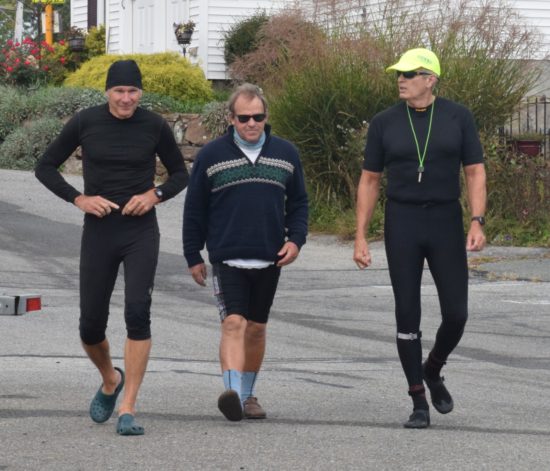
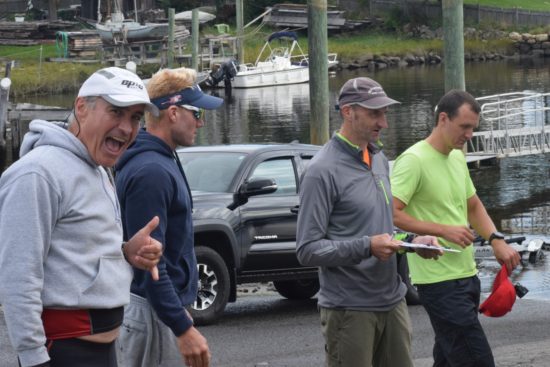
There was a disquieting buzz in air that I eventually tracked down to the growing excitement over the first ever matchup between Rob Jehn and Mike Florio. When we last saw Mike he was peeling out of the parking lot of the Narrow River Race while the rest of us were still reacting to the start gun. Rob, of course, has amassed a gaudy collection of victories this season in his relentless quest to drain the joy out of my life. We had expected that local Janda Ricci-Munn, fresh off his record-setting solo performance at the Josh Billings run-paddle-bike triathlon, would also contend for the crown. Unfortunately, he was unable to make the race due to a freak calendar malfunction. Standouts on the women’s side were Leslie Chappell and first-time New England racer Frances Hiscox. Frances specializes in endurance paddling, having completed the California 100 and Missouri River 340 (and soon the Suwannee River 230), so the ER6 would be the equivalent of a marathoner walking from her car to the start line.
In keeping with my slapdash approach to organization, I held a cursory captains’ meeting which consisted mostly of mumbling the names of past UN Secretaries General as filler. With the 10am start approaching, we launched our boats and lined up for the starter’s call. Chris Chappell positioned himself appropriately for the initial left turn and got out to the early lead, with Rob just off his starboard side. Mike and Jerry Madore followed in a second mini-wave, with me, Tim, and Hank Thorburn as forward-thinking third-wave excursionists. I had sworn to go all-in at the start in an effort to get on the draft of Rob or Mike, but apparently nowadays even the most heart-felt pledges aren’t worth the notarized, legally binding forms they’re printed on. Rather than kill myself catching the leaders, I limited myself to some superficial maiming and adopted a wait-and-see attitude. Perhaps sometime within the next few years there wouldn’t be such fierce competition.
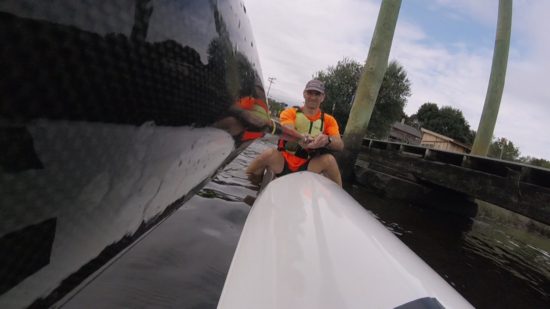
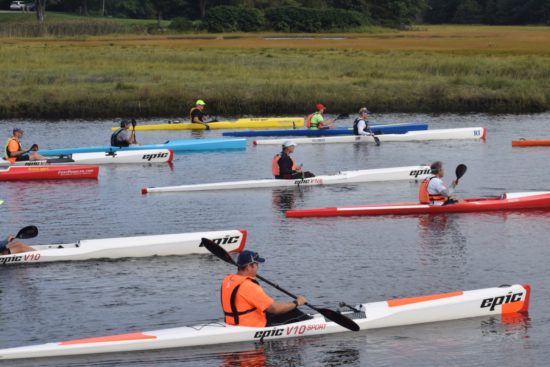
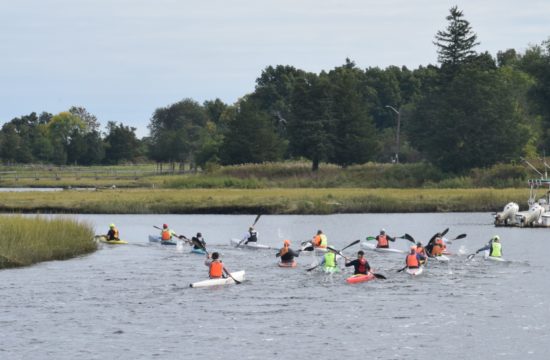
Rob slipped by Chris on the first straightaway, while Mike and I also freed ourselves from our wave-mates to move into the 2nd and 3rd positions at the next bend. I lunged for Mike’s draft, but due to a gross miscalculation in how far he was already ahead, ended up grasping at open water 3 lengths behind him. Rob enjoyed a similar lead over Mike at the time. My only hope was to play to my home field advantage. My mind racing through bathymetric charts, tidal flow diagrams, and old Family Circus comics, I plotted the optimal route to within 4 lateral inches. While the leaders took a conservative central line, I cut inside berm-like islands, wove crazily (in the fox sense, mind you) from shore to shore, and laughed uncontrollably at Billy’s hilarious malapropisms. It perhaps goes without saying that Rob and Mike continued to separate.
Even the sure-fire ace that I had up my sleeve – staying well to the right while approaching Conomo Point to avoid the speed-killing sand bar of the more direct route – failed to have much impact. Leaving the narrow strait between the point and Cross Island, Rob was was about 15 lengths ahead of me, with Mike a length or two behind him. It would take a staggering navigational faux pas up ahead for me to have any hope.
What I’ve been referring to as Cross Island is cartographically 3 tree-covered islands (Cross, Corn, and Dilly) connected by low-lying wetlands. To get a tide high enough to actually make the inter-island area navigable, however, the moon would have to be knocked into a perilously tight orbit. Perhaps the map makers were just future-proofing against melting ice caps. Lacking the patience to wait for either cataclysm, Rob and Mike decided to attempt what might be deemed a “liquid portage” between the islands. Before reaching the end of the super-island, they cut left into a meandering channel. I could barely contain my glee at the thought of them wandering aimlessly in the marshland while I claimed the race title and then rooted through their cars for loose change and candy. Rob and Mike? No, haven’t seen them. Tootsie roll? All I had to do was keep my trap shut and let nature take its course.
Unfortunately, I wasn’t confident that the paddlers behind me wouldn’t witness such silent treachery. I reluctantly called out to alert them to their mistake. Rob and Mike quickly corrected course, having sacrificed perhaps 10 lengths to me. I thereafter adopted the roll of the elderly nanny trying to corral a pair of rambunctious toddlers. Since I couldn’t keep up with them, the best I could manage was shouting directions and telling them to stop putting every little bit of flotsam in their mouths.
The visibility of your mistakes is one of the perils of bursting triumphant onto the scene, resplendent in full glory. The more sensible approach is to build up a solid foundation layer of bloopers and gaffes while paddling in mid-pack obscurity. When the better paddlers inevitably age out, get injured, adopt a new hobby, or move to Hawaii – you then use your journeyman status to back into a few victories before the next wave of athletes reminds you of your true station in life. It’s true, however, that when you have a considerable advantage in fitness and skill, you can afford a blunder or two without suffering serious consequences to your final race position.
To wit. Rounding the northeast point of Cross Island [sic], Rob gave more than ample berth to the rocks I had warned about at the captains’ meeting (somewhere between U Thant and Boutros Boutros-Ghali), then did the same for the northwest point. However, he then continued out away from the island rather than keeping to the shore. Mike took the more traditional line. Thinking that perhaps Rob was heading out to deeper water to avoid the sandy shallows I had mentioned to him before the race, I held off on yelling out a corrective warning. By the time it became clear he was freestyling an entirely different course, he was either out of earshot or self-destructively bullheaded. Apparently he had fixated his tracking mechanism on a different cluster of houses than the one I had described as a landmark during the meeting.
I assumed that once Rob saw Mike and I paddling a couple hundred meters to his port, he would surely adjust his course. And yet he continued to veer further to the right. When I asked him about this after the race, Rob said that he figured Mike was only marginally more familiar with the course than he himself, and thus paid him little heed. “But what about me?” I asked. Time slowed to a viscous crawl as I realized the humiliating enormity of my mistake. I had lobbed Rob a softball which he could hardly fail to hammer into the bleachers. And yet… he merely poked a blooper just over the shortstop’s reach. “I couldn’t see you.” That was all! Was it Rob’s generosity of spirit or his lack of killer instinct that kept him from adding the coup de grâce? “I didn’t have my binoculars handy” or “Ever since the exorcism I can’t spin my head around that far” or “[long pause] Who are you, again?” In any event, I appreciate Rob letting me slink away with my dignity tattered, but at least intact enough to still cover my shriveled ego.
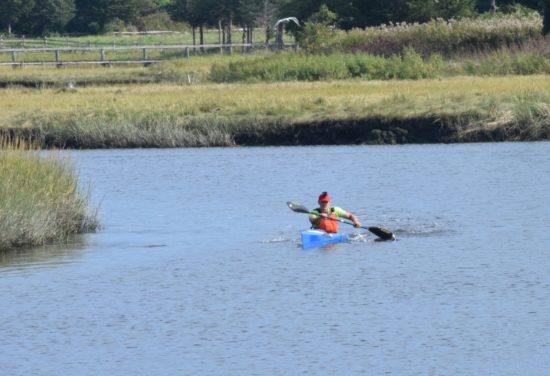
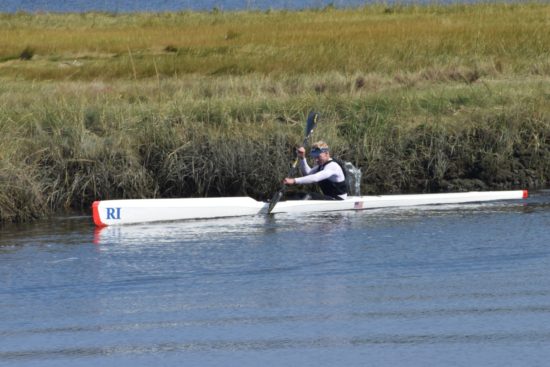
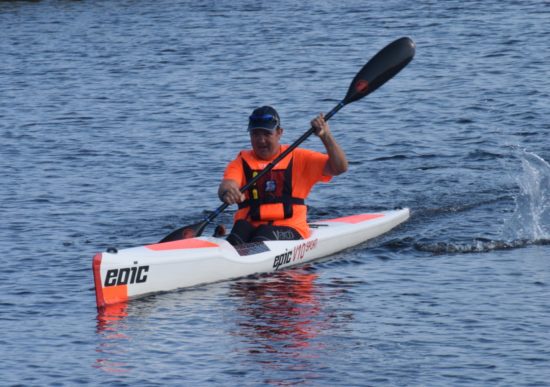
When Rob did eventually come to the conclusion that he was on the wrong path, I could hear him ratchet up his determination – even from my distant listening post. His deviant behavior had temporarily cost him the lead, but he was resolved to integrate himself back into respectable society. Rob sliced a diagonal line to Mike, chewing away the gap at a thrilling rate. Within a few moments of the course adjustment, the two were paddling side-by-side at the lead. Seeing this gripping battle unfolding ahead of me, I made an adjustment of my own – abandoning my futile goal of catching these guys in favor of keeping close enough to them to see who would emerge victorious. Just as futile an ambition, as it turns out, but at least it kept me paddling.
That was useful, because a group of competitors had formed a raiding party behind my back. Unwilling to sacrifice the esprit de corps they’d fostered as part of the Stone Dam Six at the previous race, Tim and Kirk Olsen recruited a new band of brothers for the Essex River. Chris, John Mathieu, and Jerry joined the ensemble. These 5 paddlers would finish within a minute of each other, with numerous lead changes along the way. As at the Great Stone Dam Classic, Tim succeeded in breaking free in the final stretch, putting 30 seconds on Chris. Kirk, John, and Jerry finished next in short order. This cooperative-competitive grouping has proved so popular that in the face of record demand, Tim and Kirk have announced an invitation-only policy for subsequent races. Kickbacks aren’t strictly required, but it never hurts to grease the Keels of Progress (as the guys now call themselves).
From my vantage point, it was becoming increasingly difficult to tell whether Rob or Mike was in the lead. This was mostly because there was usually at least one curve of the river blocking my view, but even when I caught the rare glimpse of the pair slipping around the next far-off corner, they were too speck-like to disambiguate. But it was Rob who pulled ahead as the finish neared, ultimately finishing at 47:00 even to Mike’s 47:14. I came in a couple of minutes later, trying to exude a “Yeah, you guys dropped me about a mile back, so I just dogged it in after that” vibe. For the third time, Leslie claimed the Essex women’s title, with Frances taking second. There were no doubles in the race, but in recognition of his long-time dedication to the race, let’s say Bill Kuklinski would have won. If only he hadn’t have been DQ’ed for lacking a partner! A rookie error from the least rookie-like guy not out there.
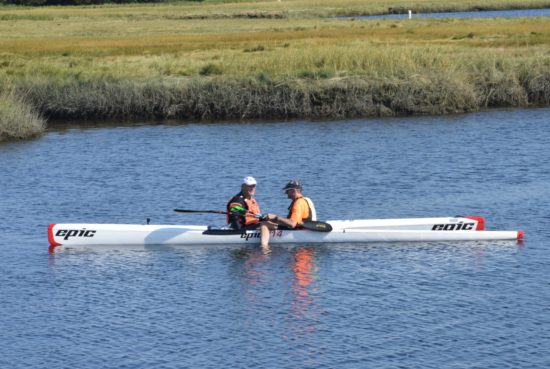
Thanks to Mary Beth for acting as photographer, timekeeper, and health care proxy.
You blinked and summer was over. You didn’t do half the things you planned, and the other half was a sorry mess. Before you blink again and find the racing season also over, why not make one last effort at finding fulfillment for 2021? Skip on over to Wesley Echol’s Plum Beach Lighthouse Race on October 16. Register at PaddleGuru.
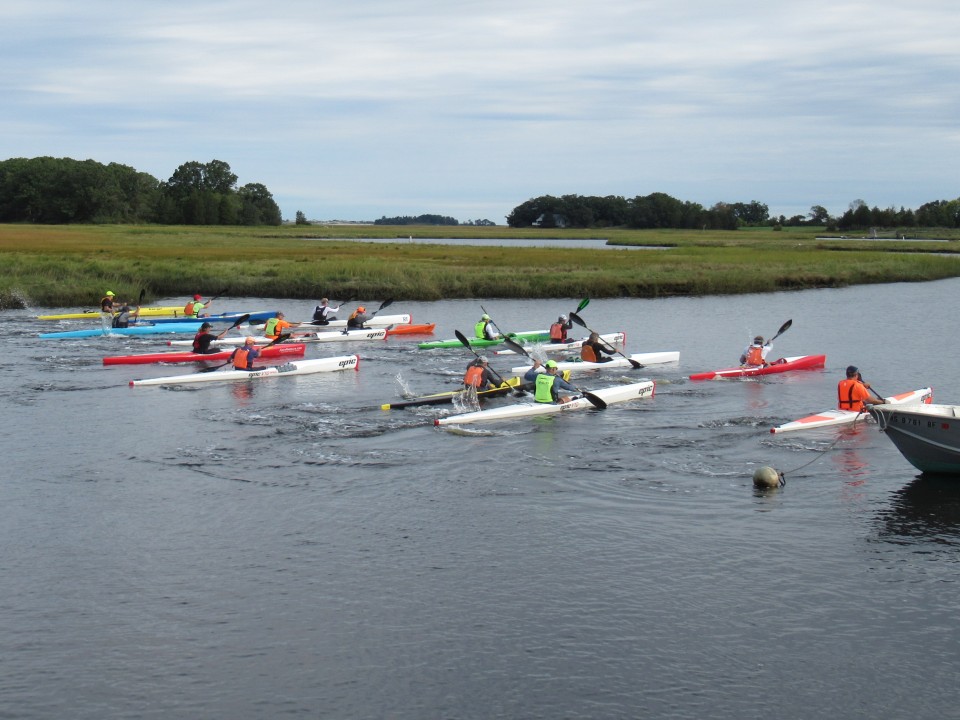
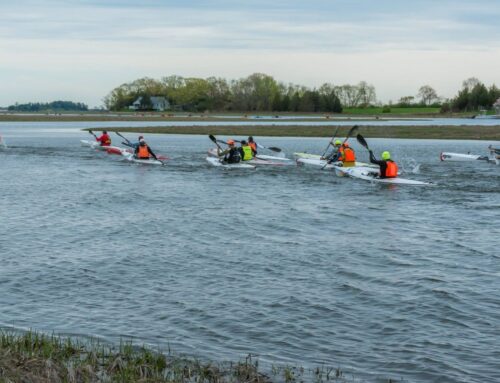
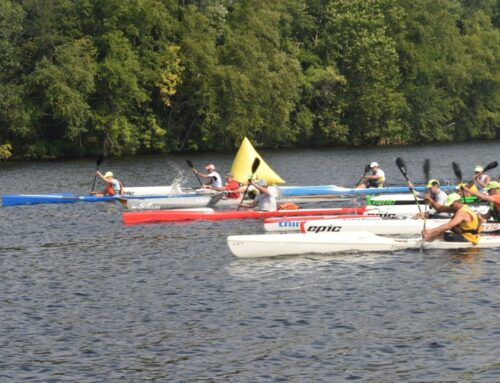
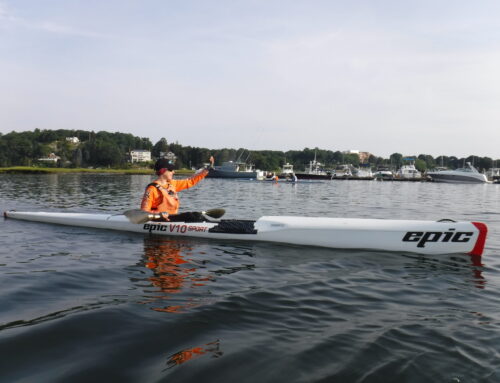
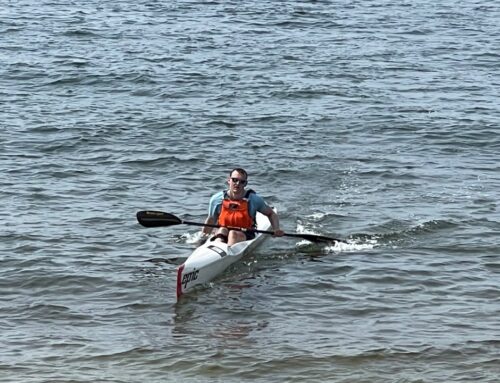
Leave A Comment
You must be logged in to post a comment.